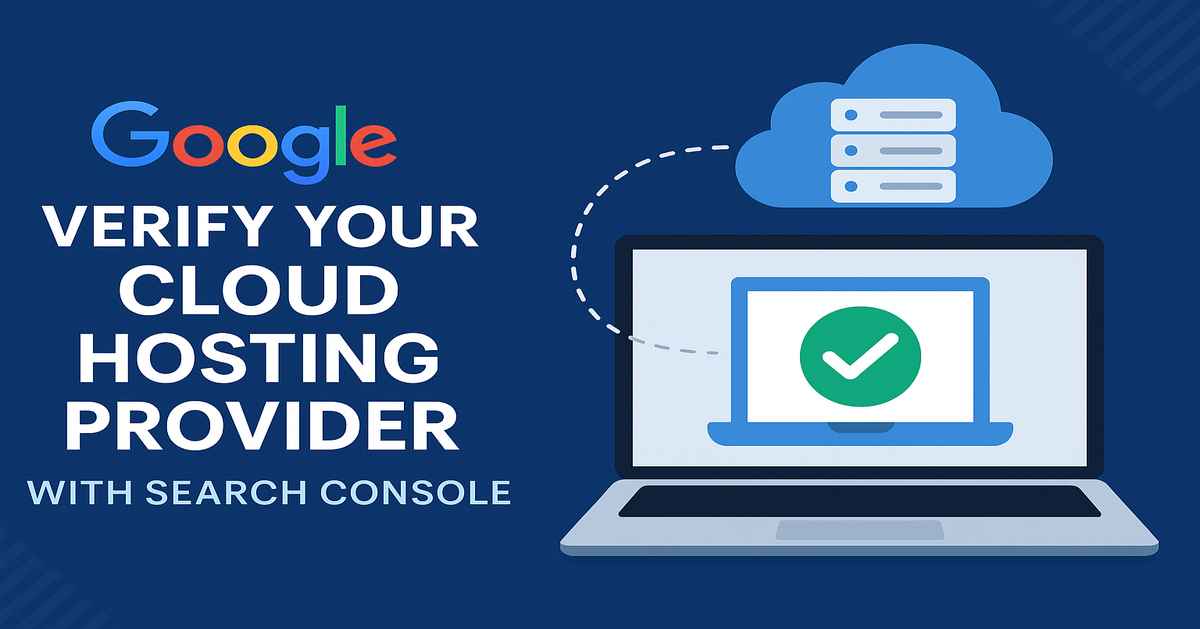Have you ever moved your website to a new server or cloud hosting provider and suddenly your search rankings dipped or pages stopped indexing? It’s frustrating and more common than most site owners realize.
Recently, Google clarified something important: you should verify your cloud hosting provider in Google Search Console, not just your domain. This ensures Google fully understands how your site and server environment are connected.
In an era where more websites rely on cloud hosting, CDN layers, and reverse proxy setups, verifying only your primary domain is no longer enough.
To put it simply if Google can’t “see” or confirm your cloud hosting environment, your indexing and crawling signals may not be accurate.
Let’s break this down in simple terms.
Why Does Google Want You to Verify Your Cloud Hosting Provider?
When your site is hosted on platforms like Cloudflare, AWS, Google Cloud, DigitalOcean, Netlify, or another CDN, Google sometimes interacts with the network layer more than your actual server.
If the hosting environment itself isn’t verified, Google may not clearly interpret:
- Where the site is actually being served from
- Who controls the system
- Whether the server is secure or spam-free
- Whether indexing and caching pathways are valid
This is where verify domain ownership and cloud provider verification come together.
In short: Verifying the cloud hosting provider helps Google trust your infrastructure fully.
How Does Verifying Cloud Providers in Search Console Work?
You don’t need to verify every CDN sub-component.
You just need to add and verify the hostname or service endpoint that actually delivers your website.
Example:
If you’re using Cloudflare → Verify the Cloudflare hostname your domain runs through.
If you’re using AWS Load Balancer → Verify the load balancer domain.
This sends Google a signal:
“Yes, this server setup belongs to us and is safe go ahead and crawl correctly.”
This prevents search indexing issues that can occur when a hosting/CDN swap happens.
Does This Matter More If You Recently Migrated Hosting?
Yes, especially during hosting migration or CDN upgrades.
When the server stack changes, Google needs reassurance that the website didn’t change ownership or become a risky domain.
If this verification isn’t done, you may see:
- Sudden drop in crawl frequency
- Pages going Discovered – Not Indexed
- Delayed indexing
- Incorrect canonical signals
- Temporary ranking declines
This is why Google’s reminder is timely.
How Is This Related to DNS Configuration and SEO Performance?
Your DNS configuration determines how Google reaches your site.
If the DNS, CDN, and host aren’t all connected and verified, Google may slow down crawling to avoid security risks.
A site with clean, verified signals gets crawled faster and indexed more predictably.
As one cloud infrastructure analyst puts it,
“Search engines don’t just trust websites they trust systems.”
If the system isn’t verified, the website’s authority is weakened.
How to Verify Your Cloud Hosting Provider (Simple Steps)
- Open Google Search Console
- Add a new Domain Property or URL Prefix Property
- Use the DNS TXT record verification option
- Add the DNS record to your domain or hosting
- If you use a CDN, also verify the CDN-source hostname (like example.cloudflare.net or elb.amazonaws.com)
- Click Verify
FAQs
1. Do I need to verify both my domain and cloud hosting provider?
Yes. Domain verification confirms ownership, hosting verification confirms server trust and configuration.
2. Does this apply if I only use shared hosting?
In most simple shared hosting setups, verifying the domain is enough unless a CDN layer is added.
3. Will verifying my cloud provider improve rankings automatically?
Not directly. But it helps maintain stable crawling and indexing, which supports consistent rankings.
4. What if I don’t verify my hosting provider?
You might experience delayed indexing, incorrect caching, or crawling inefficiencies.
5. Do I need to re-verify if I switch hosting again?
Yes always verify after any major hosting or CDN change.
Conclusion
Cloud hosting setups are more layered now and Google wants clear transparency in those layers. Verifying your hosting provider in Search Console ensures better crawling, stable indexing, and stronger trust signals.
If you’ve recently changed hosting, CDNs, or are planning a migration, this small step can prevent big SEO headaches.
Have thoughts or questions? Drop them below I’d love to hear your take.
